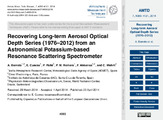Por favor, use este identificador para citar o enlazar este ítem:
http://hdl.handle.net/20.500.11765/6516
Recovering long-term aerosol optical depth series (1976–2012) from an astronomical potassium-based resonance scattering spectrometer [Discussion paper]
Registro completo de metadatos
| Campo DC | Valor | Lengua/Idioma |
|---|---|---|
| dc.contributor.author | Barreto Velasco, África | es_ES |
| dc.contributor.author | Cuevas Agulló, Emilio | es_ES |
| dc.contributor.author | Pallé, Pere | es_ES |
| dc.contributor.author | Romero Campos, Pedro Miguel | es_ES |
| dc.contributor.author | Almansa Rodríguez, Antonio Fernando | es_ES |
| dc.contributor.author | Wehrli, Christoph J. | es_ES |
| dc.date.accessioned | 2017-03-27T07:44:48Z | - |
| dc.date.available | 2017-03-27T07:44:48Z | - |
| dc.date.issued | 2014 | - |
| dc.identifier.citation | Atmospheric Measurement Techniques Discussions. 2014, 7, p. 4093–4121 | es_ES |
| dc.identifier.issn | 1867-8610 | - |
| dc.identifier.uri | http://hdl.handle.net/20.500.11765/6516 | - |
| dc.description.abstract | A 37-year long-term series of monochromatic aerosol optical depth (AOD) has been recovered from solar irradiance measurements performed with the solar spectrometer Mark-I, deployed at Izaña mountain since 1976. The instrument operation is based on the method of resonant scattering, which affords wavelength absolute reference and stability (long-term stability and high precision) in comparison to other instruments based purely on interference filters. However, it has been specifically designed as a reference instrument for helioseismology, and its ability to determine AOD from transmitted and scattered monochromatic radiation at 769.9 nm inside a potassium vapour cell in the presence of a permanent magnetic field is evaluated in this paper. Particularly, the use of an exposed mirror arrangement to collect sunlight as well as the Sun–laboratory velocity dependence of the scattered component introduces some important inconveniences to overcome when we perform the instrument's calibration. We have solved this problem using a quasi-continuous Langley calibration technique and a refinement procedure to correct for calibration errors as well as for the fictitious diurnal cycle on AOD data. Our results showed similar calibration errors retrieved by means of this quasi-continuous Langley technique applied in different aerosol load events (from 0.04 to 0.3), provided aerosol concentration remains constant throughout the calibration interval. | es_ES |
| dc.description.sponsorship | The AERONET sunphotometer at Izaña has been calibrated within AERONET-Europe TNA supported by the European Community-Research Infrastructure Action under the FP7 “Capacities” specific programme for Integrating Activities, ACTRIS Grant Agreement no. 262254. The GAW-PFR network for AOD at GAW Global observatories has been implemented by the World Optical Depth Research and Calibration Center (WORCC). The Mark-I operation was supported by the Spanish National Plan of Research and Development under the grant no. AYA2012–17803. | es_ES |
| dc.language.iso | eng | es_ES |
| dc.publisher | European Geosciences Union | es_ES |
| dc.rights | Licencia CC: Reconocimiento CC BY | es_ES |
| dc.subject | Aerosoles | es_ES |
| dc.subject | Contaminación atmosférica | es_ES |
| dc.subject | Espectrómetros | es_ES |
| dc.subject | Spectrometer | es_ES |
| dc.subject | Aerosol optical depth | es_ES |
| dc.title | Recovering long-term aerosol optical depth series (1976–2012) from an astronomical potassium-based resonance scattering spectrometer [Discussion paper] | es_ES |
| dc.type | info:eu-repo/semantics/article | es_ES |
| dc.relation.publisherversion | http://dx.doi.org/10.5194/amtd-7-4093-2014 | es_ES |
| dc.rights.accessRights | info:eu-repo/semantics/openAccess | es_ES |
| dc.relation.projectID | info:eu-repo/grantAgreement/EC/FP7/262254 | es_ES |
| Colecciones: | Artículos científicos 2010-2014 | |
Ficheros en este ítem:
| Fichero | Descripción | Tamaño | Formato | ||
|---|---|---|---|---|---|
| amtd-7-4093-2014.pdf | 1,14 MB | Adobe PDF |  Visualizar/Abrir |
Los ítems de Arcimis están protegidos por una Licencia Creative Commons, salvo que se indique lo contrario.





